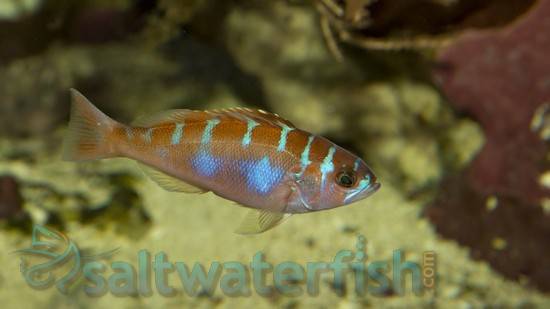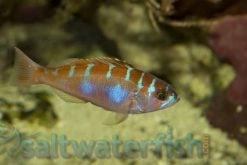Chalk Basslet – (Serranus tortugarum)
Quick Stats:
- Care Level: Easy
- Temperament: Peaceful
- Diet: Carnivore
- Reef Safe: Yes
- Minimum Tank Size: 30 gallons
- Max Size: 3 inches
- Water Parameters: pH 8.1-8.4, Salinity 1.023-1.025, Temperature 72-78°F
Comprehensive Guide: Chalk Basslet – (Serranus tortugarum)
Habitat: The Chalk Basslet, also known as Serranus tortugarum, is native to the Western Atlantic Ocean, specifically found around the Florida Keys and the Caribbean. They inhabit coral reefs, rocky areas, and seagrass beds, often seen in depths ranging from 10 to 100 feet.
Reef Safe: The Chalk Basslet is considered reef safe, making it a suitable addition to a reef aquarium. It generally does not bother corals or other invertebrates.
Size: These basslets typically reach a maximum size of about 3 inches, making them suitable for smaller saltwater aquariums.
Temperament: Chalk Basslets have a peaceful temperament and are generally non-aggressive towards other fish. However, they may become territorial if kept in a small tank with other similarly-sized species.
Sexual Dimorphism: Male Chalk Basslets tend to have more intense coloration compared to females. Males often display vibrant yellow or orange hues, while females have a more subdued coloration.
Lifespan: With proper care, Chalk Basslets can live for 5 to 10 years in captivity.
Diet in Aquariums: In the wild, Chalk Basslets primarily feed on small crustaceans and fishes. In an aquarium setting, they should be provided with a varied diet consisting of high-quality frozen or live foods such as brine shrimp, mysis shrimp, and small fish pieces. It is essential to offer a balanced diet to maintain the health of these fish.
Aquascaping Recommendations: The Chalk Basslet appreciates plenty of hiding spots and caves within the aquarium. Providing live rock structures with crevices and overhangs will create suitable hiding places for them. It is also recommended to have a sandy substrate and open swimming spaces for their comfort.
Captive Bred Availability: The Chalk Basslet is occasionally available as captive-bred specimens. These captive-bred fish tend to have higher survival rates and are generally healthier and less stressed compared to wild-caught specimens. Check with reputable aquarium stores or breeders for availability.
Compatibility with Other Fish, Invertebrates or Corals: Chalk Basslets are generally peaceful and can be kept with a variety of tankmates. However, caution should be exercised when introducing them to aggressive or larger fish species. Suitable tankmates for Chalk Basslets include:
- Clownfish: These colorful and popular clownfish make great companions for Chalk Basslets. They are both peaceful and have similar dietary requirements.
- Firefish Goby: Firefish gobies are peaceful and add movement and color to the aquarium. They generally occupy different areas of the tank, minimizing competition.
- Yellowtail Damsel: These damsels are hardy and can withstand the occasional territorial behavior of Chalk Basslets. They add vibrant yellow color to the tank.
- Cleaner Shrimp: Chalk Basslets can coexist with cleaner shrimp, forming a symbiotic relationship where the shrimp clean parasites off of the fish’s body.
- Zoanthids: These colorful and easy-to-care-for corals can coexist with Chalk Basslets, adding beauty to the reef tank.
Other Common Names: The Chalk Basslet is also known as the Chalk Bass or the White Basslet.
Why Buy from Reefs4Less.com: Reefs4Less.com is a reputable online retailer that offers high-quality saltwater fish and corals. They source their livestock from trusted suppliers and provide detailed information about each species. Reefs4Less.com ensures proper packaging and shipping procedures to minimize stress on the fish during transit. They also offer a satisfaction guarantee and excellent customer service.
Popular Questions and Answers for Chalk Basslet – (Serranus tortugarum) in Saltwater Aquariums:
1. Are Chalk Basslets suitable for beginners?
Yes, Chalk Basslets are considered an excellent choice for beginners due to their easy care requirements and peaceful temperament.
2. Can Chalk Basslets be kept in a reef tank?
Yes, Chalk Basslets are considered reef safe and can coexist with corals and other invertebrates in a reef aquarium.
3. How often should Chalk Basslets be fed?
Chalk Basslets should be fed small amounts multiple times a day. Providing them with a varied diet ensures their nutritional needs are met.
4. Do Chalk Basslets require a specific lighting setup?
While Chalk Basslets do not have specific lighting requirements, providing moderate to high lighting will enhance the colors of their scales, making them more vibrant.
5. Can Chalk Basslets jump out of the aquarium?
Yes, like many fish species, Chalk Basslets have the potential to jump out of uncovered aquariums. It is recommended to provide a secure lid or mesh to prevent any accidental escapes.
| Size | < 2 inches |
|---|



Reviews
There are no reviews yet.